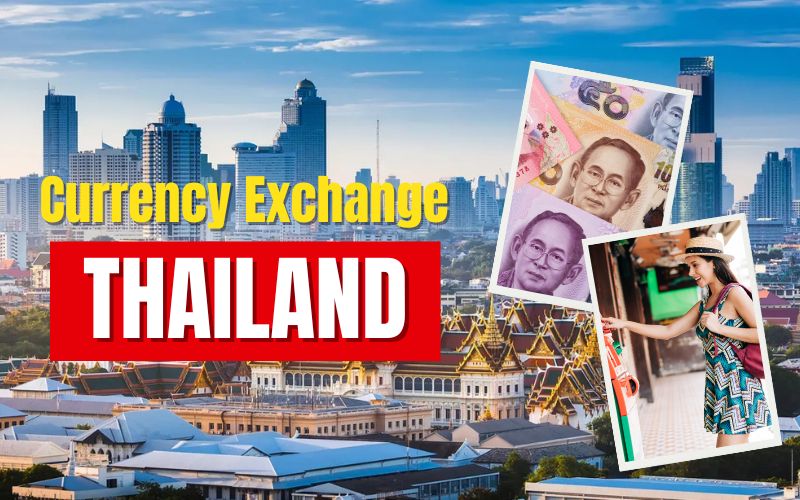
Are you preparing for a trip to Thailand and encountering challenges with currency exchange? If so, you found the right blog because, in this piece of information, we will guide you through Thailand currency exchange, from where to exchange money to how to get a good exchange rate, safety tips, and more. Whether you are heading to the bustling Bangkok or the tranquil beaches of Phuket, this blog can help you feel confident handling your money overseas and entirely enjoy your trip to the Land of Smiles!
Overview of Thailand’s Currency
What is the currency in Thailand?
The official currency in Thailand is the Thai baht, and the international currency code is THB. A baht is subdivided into 100 satang, but in reality, due to its small value, it is rarely used. Thailand uses the baht in daily transactions, ranging from shopping and dining to tourism services. Unlike some countries in the region, Thai people seldom use foreign exchange in their daily lives.
Because of the stability of economic and monetary policies, it is considered one of the most stable currencies in Southeast Asia. This makes it a reliable means of payment for local people and foreign tourists.
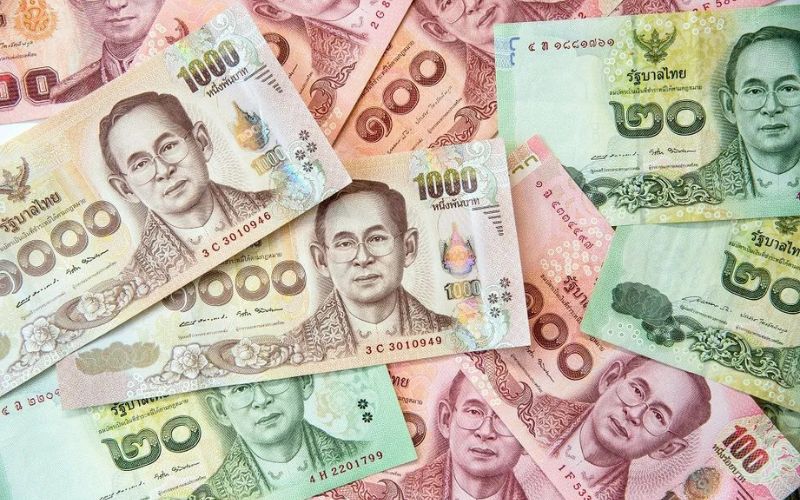
The Thai Baht, the official national currency of Thailand
Thailand’s currency unit
The Thai baht was officially used at the end of the 19th century and remained in the national monetary system to this day. Today, there are two main forms of Thai currency in circulation:
- Banknotes with denominations of 20฿, 50฿, 100฿, 500฿ and 1000฿.
- Coins with denominations of 1฿, 2฿, 5฿, and 10฿, along with 25 and 50 satang coins.
Each banknote and coin has a different color and size, which is easy to distinguish. Stamps are usually printed with the portrait of the King of Thailand, especially the portrait of King Rama IX, which is typically a symbol of national stability and development. It is particularly worth noting that Thai people respect their currency so much because it is related to the image of the King, who is regarded as the spiritual leader of the country. Therefore, Thai laws may punish actions such as tearing, trampling, or disrespecting money as offensive.
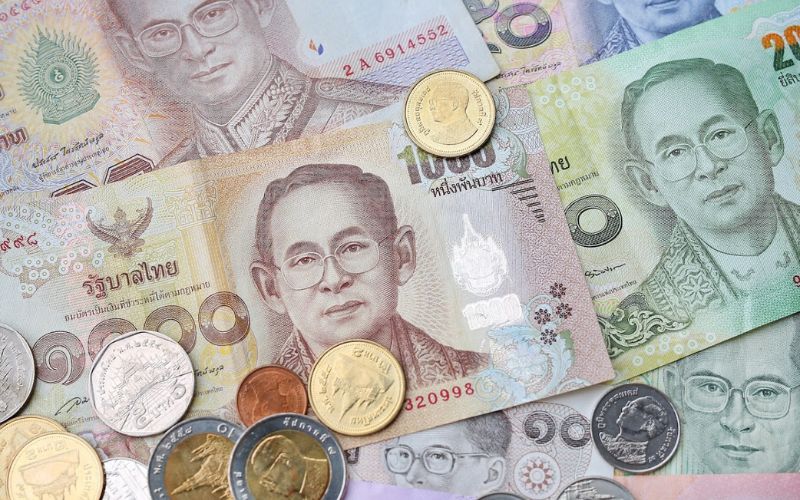
Thailand coins and banknotes
Thailand Currency Exchange
Currency exchange rate
The exchange rate between the Thai baht and other currencies, such as the US dollar (USD), euro (EUR) or Vietnam dong (VND), always fluctuates depending on the international financial market. For reference, the popular exchange rate can fluctuate as follows: 1 USD ≈ 32.73 THB, 1 EUR ≈ 37.13 THB, and 1,000 VND ≈ 1.26 THB. However, this number will change depending on where you exchange money. Every bank, private money exchange office, or airport money exchange office has different exchange rates and service charges. Please note that the exchange rate changes frequently; please check it before your travel on websites such as Wise and other trustworthy ones.
Best places to exchange money in Thailand
When changing money in Thailand, one of the most important principles is to avoid changing money at the airports unless you need a small amount of money to move or make initial expenses. At international airports such as Suvarnabhumi or Don Mueang, the fares are usually much lower than those in cities, and additional fees may be required.
Instead, you should exchange money at a reputable private money exchange in the central area. Well-known brands like SuperRich Thailand, SIA Money Exchange, or Value Plus are prominent in tourist areas like Siam and Pratunam (Bangkok), as well as major business centers. Another advantage is that they usually publish daily exchange rate updates on official websites or exchanges so that you can easily compare them before exchanging.
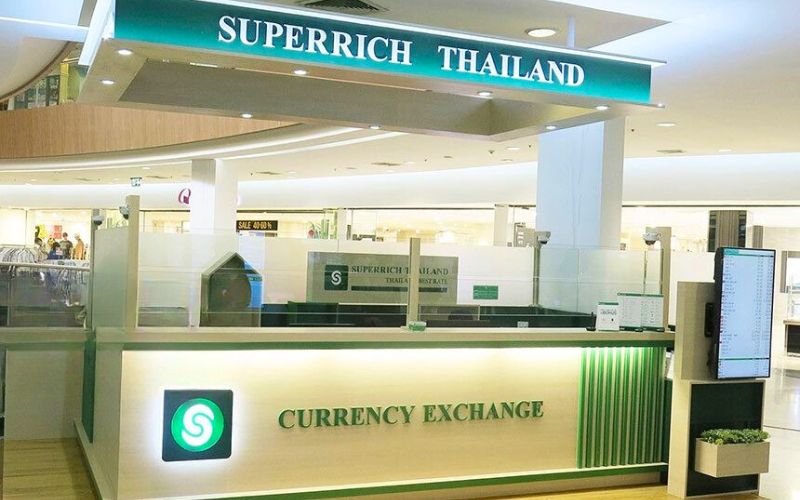
SuperRich Thailand, one of the most prestigious currency exchange brand in Thailand
>>> Embark on an exciting trip to Thailand and explore the beauty of the bustling Bangkok with out The Perfect Tour in Bangkok 6 Days.
Which money should exchange?
If you are traveling to major cities and tourist areas such as Bangkok, Chiang Mai, and Phuket, you do not need to exchange a large amount of USD/EUR into Thai Baht because many shops, hotels, and services here still accept USD/EUR. It is recommended to convert just a small amount of money for everyday expenses like street food, local markets, or tuk-tuk rides.
In addition, you can also consider using an international payment card (Visa, MasterCard) or an international remittance platform, such as Wise, Revolut, or Payoneer. These services usually use the market exchange rate, and the transfer fee is lower than that of traditional banks. However, before using it, please check the related fees that your bank may charge in advance.
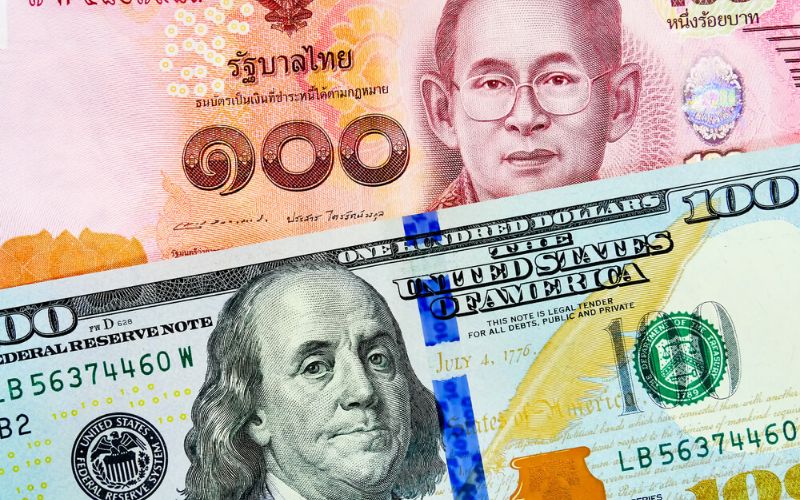
Exchanging money from USD to Baht
Cash vs. credit card: What is the best for travelers?
When planning a trip to Thailand, one of the most frequently asked questions of visitors is, should they bring cash or a credit card’? There is no “right” answer because it depends on which kind of travel you go for, the places you visit, and the level of comfort you want to experience. Now, let’s analyse the pros and cons of using cash and credit cards during your trip to Thailand.
Regarding cash, it is still the most popular payment method in Thailand, especially in areas like night markets, tuk-tuks, food vendors, villages, or small restaurants. Bringing a small amount of cash makes it simple to foot minor bills. The advantage of cash is that you don’t have to pay for international transactions, like using a credit card. In addition, using cash can help you better control your expenses and avoid impulsive shopping. However, carrying too much cash may also lead to the risk of loss or theft. Therefore, please carry enough cash and divide it into different locations within your luggage or personal belongings.
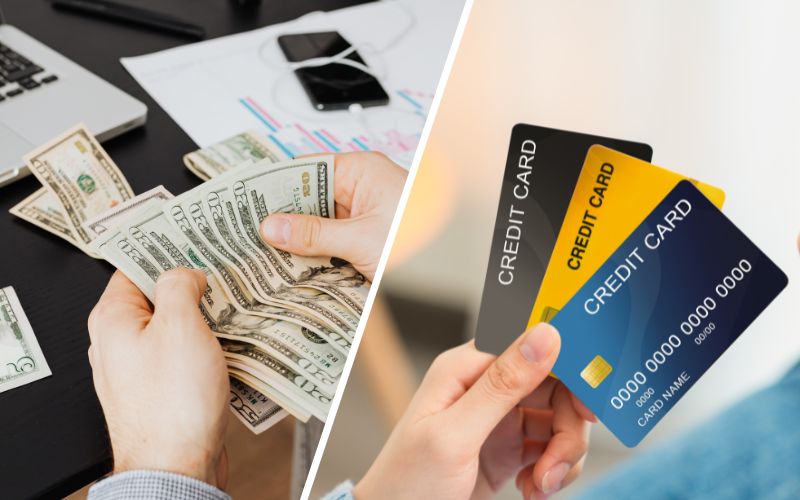
Should travelers pay by cash or credit card?
Credit cards or international debit cards (Visa, MasterCard, or UnionPay) are very useful when you need to pay for large-scale services, such as hotel reservations, air tickets, travel, or shopping centers. Most locations in Bangkok, Phuket, and Chiang Mai, as well as luxury resorts, accept credit card payments. Using a credit card can help you avoid carrying a lot of cash, and at the same time, you can get points, discounts, refunds, or travel insurance from the issuing bank. However, please note that some cards may charge 2%–4% for international transactions, and the exchange rate is not always favorable to you. Check the bank card’s payment limit and international transaction fees carefully before you depart.
>>> Have you been dreaming about a journey to Thailand, where you can admire intricate architectures, indulge in pristine beaches, explore the jungles, and savor delicious Thai cuisines? Let make your dream come true with out Thailand Travel Tours & Packages for 2025/2026.
Common Currency Exchange Scams in Thailand
When exchanging money in Thailand, most transactions are safe, especially if you stick to well-known banks and licensed exchange booths. However, like in many popular tourist destinations, there are a few common scams to watch out for. Here’s a breakdown:
- Unlicensed Money Changers: Some unofficial currency exchange booths may offer rates that seem “too good to be true”, and they often are. They often advertise a high exchange rate, but the actual rate is often higher. They may even provide you with counterfeit or outdated money that is no longer usable.
- Shortchanging tourists: Some changers will count the money quickly or distract you while handing over the cash to give you less than the full amount.
- “Fixed” exchange rates at hotels or airports: While not necessarily a scam, many hotels and airport counters offer very poor exchange rates, often 10-15% off the market rate.
- Currency Switch Trick: Some people may pretend that the money you give them is counterfeit or torn, then offer to exchange it for a worse rate or keep your money. In this case, you should be confident and understand the value and form of your money, as well as that of Thailand. If you’re unsure, resist the urge to exchange money.
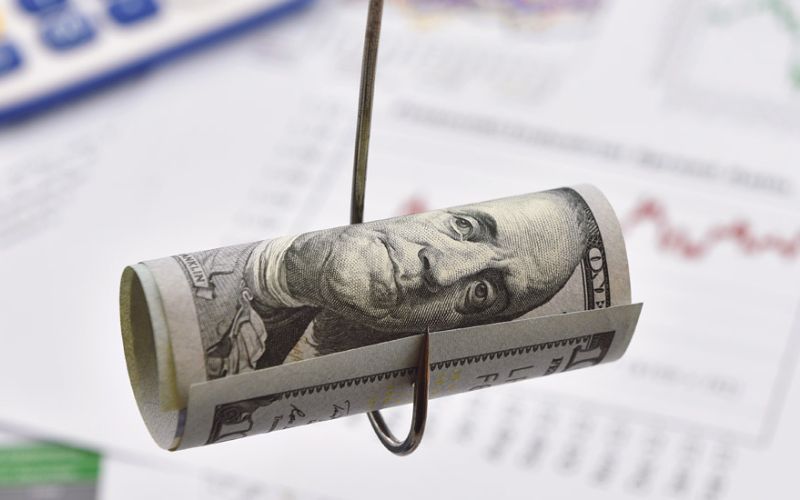
Money Scams
>>> Planning a trip to Thailand and worrying about scams? Read our Thailand Tourist Scams: Must Avoid for a Safe Travel for better preparation!
Safety tips for exchanging money in Thailand
When traveling in Thailand, exchanging money is the first step for a smooth holiday and to avoid unexpected troubles. While exchanging currency in Thailand may not be a significant issue, you should exercise caution due to the low exchange rate and concerns about safety. Here are some helpful tips you should save for your trip to Thailand.
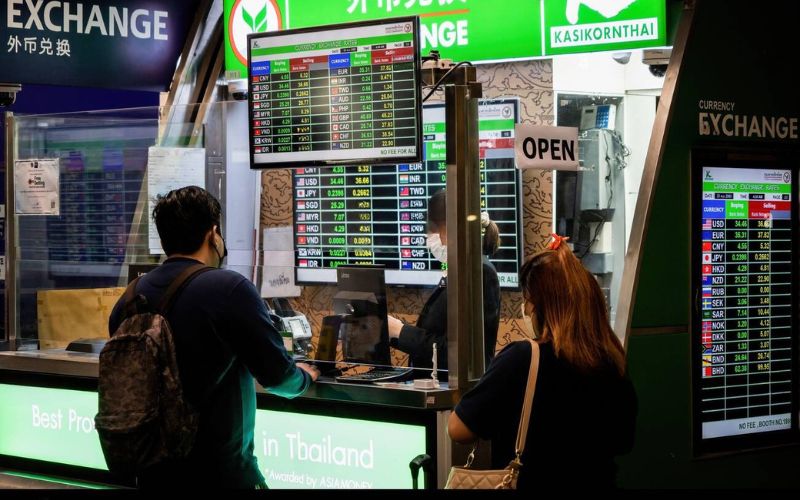
Currency exchanging booth in Thailand
- Avoid exchanging money at the airport: At airports, money exchange offices usually use lower exchange rates, which may be accompanied by hidden fees. If necessary, you should exchange a small sum of money, which is enough to transfer to the city center, and exchange it at a reputable place in the city.
- Find the trustworthy credit exchange counter: Addresses like SuperRich, Value Plus, or the SIA Exchange are good choices for competitiveness and transparency. You should choose a counter with an open exchange rate table, a clear business license, and lots of people coming and going.
- Comparison of exchange rates before you do: The exchange rates between currency exchange offices may be different, even only a few blocks apart. Before deciding to exchange, you should go to several places, ask about prices, and compare them so as to choose the most favorable exchange point, especially when you’re exchanging a large amount of money.
- Exchange money during administration hours: Most exchange offices with favorable exchange rates are open during office hours, usually from 9 am to 6 pm. Avoid Avoid exchanging currency at night or on weekends, as there may be fewer options available and the exchange rate is likely to be less favorable than usual.
- Make sure to count the money immediately after the exchange: To prevent errors, you should verify and recount the money in front of the employees. Counting again after leaving the counter may mislead you and make it hard to complain about a shortage.
- Keep the receipt for money: The receipt is a valid proof of transaction. If a problem arises, you can use it to lodge a complaint or easily convert it into foreign currency before departing Thailand. In addition, some airports need a receipt if you want to change it into foreign currency when you leave the country.
- Don’t exchange money on the street or with strangers: Exchanging money “illegally” can expose you to scams, counterfeit money, or extremely low exchange rates. Therefore, always choose clearly licensed locations and do not exchange money with strangers no matter how attractive their offers are.
In conclusion, exchanging money when travelling to Thailand seems simple but plays a vital role in your experience. Knowing the exchange rate, choosing the right currency exchange place, having a flexible combination of cash and credit cards, and some safety tips will help you save costs, avoid risks, and remain proactive under any circumstance. Be fully prepared and manage your finances wisely, and you will have a smooth and interesting trip to Thailand without worrying about money. If you need further information about planning a trip to Thailand, don’t hesitate to contact us; our experts are willing to help at any time!
Read more:




How much should I exchange for a week holiday in Thailand? I go with my friends, 3 in total.
Dear Sir,
Thank you for reaching out to us! Our experts have contacted you via email, please check it out!
Best regards,
IDC Travel Team.
I was reading the blog and found the tips quite useful, but how strict are Thai money changers about the condition of foreign banknotes? Should I be worried if my bills have small creases or marks?
Thai money changers can be surprisingly strict about the condition of foreign banknotes, especially for USD. Even small creases, tears, ink marks, or worn edges may lead to rejection or a lower exchange rate. It’s best to bring clean, crisp bills, preferably newer series notes. While minor creases might occasionally be accepted, it’s safer to assume that anything less than pristine could be problematic. If possible, exchange at reputable places like SuperRich, which tend to be more consistent.